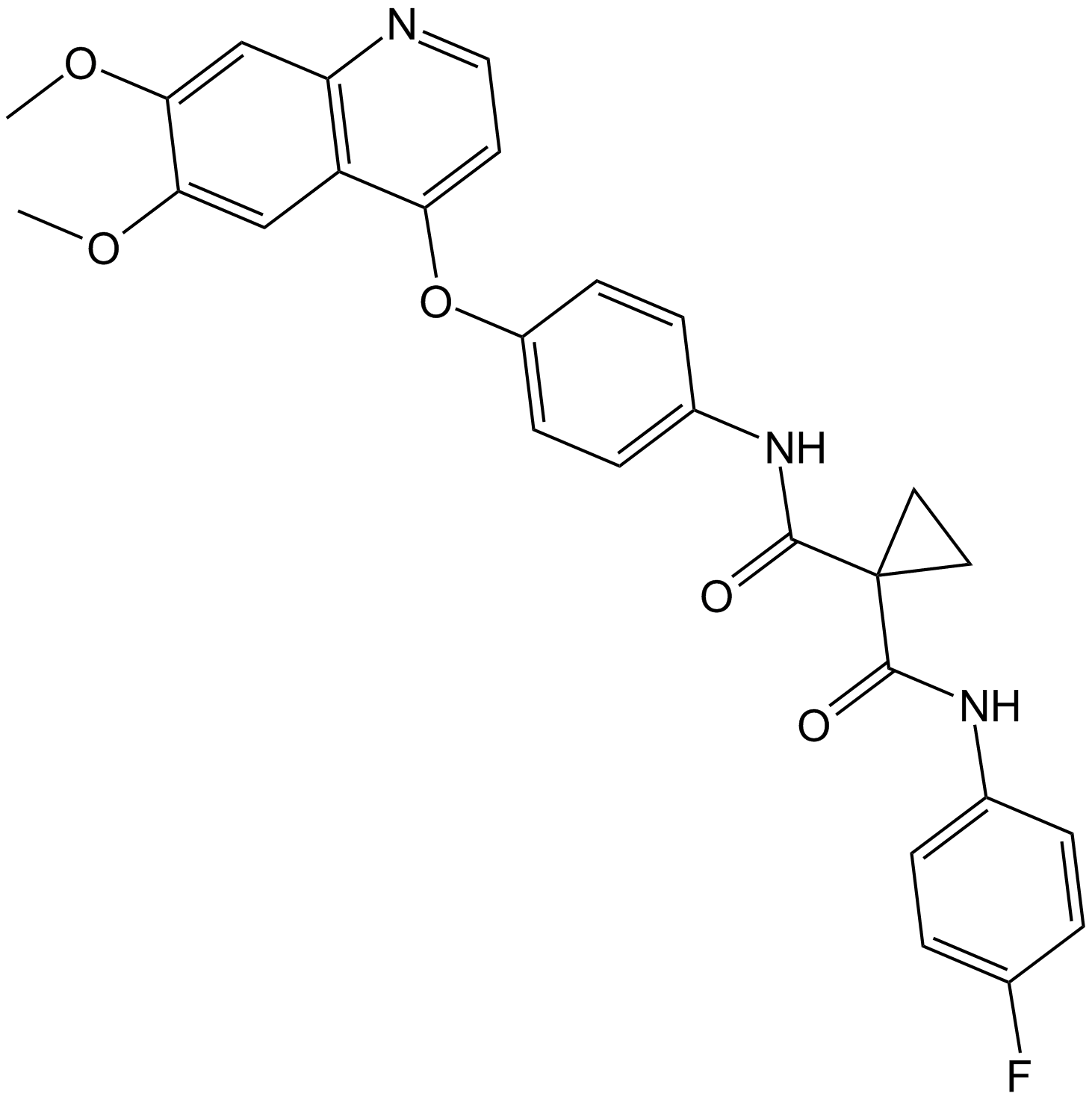Cabozantinib (XL184, BMS-907351) (Synonyms: BMS-907351, Cabozantinib) |
| Catalog No.GC15779 |
Cabozantinib (XL184, BMS-907351) is a potent and orally active inhibitor of VEGFR2 and MET, with IC50 values of 0.035, and 1.3 nM, respectively. Cabozantinib (XL184, BMS-907351) displays strong inhibition of KIT, RET, AXL, TIE2, and FLT3 (IC50=4.6, 5.2, 7, 14.3, and 11.3 nM, respectively). Cabozantinib (XL184, BMS-907351) shows antiangiogenic activity. Cabozantinib (XL184, BMS-907351) disrupts tumor vasculature and promotes tumor and endothelial cell apoptosis.
Products are for research use only. Not for human use. We do not sell to patients.

Cas No.: 849217-68-1
Sample solution is provided at 25 µL, 10mM.
Cabozantinib (XL184,BMS-907351) is a novel MET and VEGFR2 inhibitor that simultaneously inhibits metastasis, angiogenesis and tumor growth[1]. Its IC50 values for VEGFR2 and c-Met are 0.035 nM and 1.3 nM[2].
Cabozantinib(XL184) treatment of MAME cultures of MDA-MB-231 and HCC70 cells (HGF-expressing fibroblasts) was cytotoxic and significantly reduced multicellular invasive outgrowths, even in cultures with HGF-expressing fibroblasts[3]. The cellular stress induced by Cabozantinib resulted in the induction of ICD (a peculiar type of apoptosis) in DU-145 cell line[4]. Cabozantinib has been reported to inhibit MMP-1 expression by blocking the HGF-MET signaling pathway in bladder cancer cells[5]. MMP-1 was significantly decreased in ESCC cells treated with cabozantinib, which was the reason for the decreased migration activity of ESCC cells treated with cabozantinib[6].
Cabozantinib inhibits tumor growth in a dose-dependent manner in human tumor models in rodents[1]. In vivo pharmacodynamic studies showed substantial inhibition of RET in TT xenograft tumors following a single oral dose of cabozantinib[7]. Cabozantinib showed excellent antitumor effects in vivo using CRC(colorectal cancer) explants model[8].
References:
[1]. Yakes F Michael,Chen Jason, et al. Cabozantinib (XL184), a novel MET and VEGFR2 inhibitor, simultaneously suppresses metastasis, angiogenesis, and tumor growth.[J]. Molecular cancer therapeutics,2011,10(12).
[2]. Weon-Kyoo You, Barbara Sennino, et al. VEGF and c-Met Blockade Amplify Angiogenesis Inhibition in Pancreatic Islet Cancer[J]. Microenvironment and Immunology,2011.
[3]. Sameni Mansoureh,Tovar Elizabeth A, et al. Cabozantinib (XL184) Inhibits Growth and Invasion of Preclinical TNBC Models.[J]. Clinical cancer research : an official journal of the American Association for Cancer Research,2016,22(4).
[4] Scirocchi Fabio,Napoletano Chiara,et al. Immunogenic Cell Death and Immunomodulatory Effects of Cabozantinib[J]. Frontiers in Oncology,2021,11.
[5] Shintani T, Kusuhara Y, et al. The involvement of hepatocyte growth factor-MET-matrix metalloproteinase 1 signaling in bladder cancer invasiveness and proliferation. Effect of the MET inhibitor, cabozantinib (XL184), on bladder cancer cells. Urology. (2017) 101:169.e7-13. doi: 10.1016/j.urology.2016.12.006.
[6] Pei-Wen Yang, Yu-Cheng Liu, et al. Cabozantinib (XL184) and R428 (BGB324) Inhibit the Growth of Esophageal Squamous Cell Carcinoma (ESCC)[J]. Frontiers in Oncology, 2019.
[7] Bentzien Frauke,Zuzow Marcus, et al. In vitro and in vivo activity of cabozantinib (XL184), an inhibitor of RET, MET, and VEGFR2, in a model of medullary thyroid cancer.[J]. Thyroid : official journal of the American Thyroid Association,2013,23(12).
[8] Scott Aaron J,Arcaroli John J,et al. Cabozantinib Exhibits Potent Antitumor Activity in Colorectal Cancer Patient-Derived Tumor Xenograft Models via Autophagy and Signaling Mechanisms.[J]. Molecular cancer therapeutics,2018,17(10).
Average Rating: 5 (Based on Reviews and 8 reference(s) in Google Scholar.)
GLPBIO products are for RESEARCH USE ONLY. Please make sure your review or question is research based.
Required fields are marked with *




















